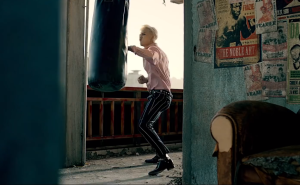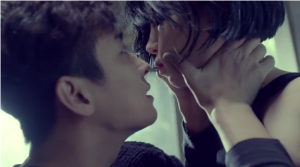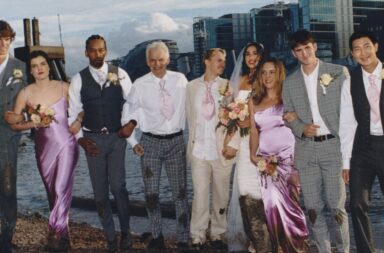 GOT7‘s latest MV for “If You Do” showcases a new side of the boy group; an angsty, tortured, and no doubt violent side that many fans wouldn’t have seen coming following the sugary-sweet “Just Right” only months before.
GOT7‘s latest MV for “If You Do” showcases a new side of the boy group; an angsty, tortured, and no doubt violent side that many fans wouldn’t have seen coming following the sugary-sweet “Just Right” only months before.
While a fan of the release overall, one plot point still plagues me because it is seen all too often in K-pop: masculine aggression being used in the MV to demonstrate maturity and growth. Why is violence on the part of boy groups written off as ‘teen angst’ when it is coupled with lyrics that deal with love?
When considering the idea of masculine aggression and a maturing image, one has to acknowledge that it’s nothing new in popular culture to represent hyper-masculinity through violence. Unfortunately, it’s a pretty common trope that is in no way unique to K-pop; but K-pop does continue to play into it.
Hordes of boy groups have released MVs with gratuitous fighting to show off a more (heroic) masculine image in recent years: Infinite‘s “Back,” B.A.P.’s “One Shot” and LC9‘s “MaMa Beat.” Even the boys of Exo got their chance to kick some butt in the “Wolf” Drama MV. Of course, all these MVs were produced to send a similar message: We are not boys anymore, we are men. Now, swoon while you watch us punch some stuff.
 In an attempt to showcase a more mature image, masculine aggression manifests itself in many different ways in K-pop; some groups go for a gangster theme, while others choose a revenge plot with lots of guns, or some groups just fight for no real reason. Rarely, in any instance, does the content of the track have much relation to the violent MV narrative.
In an attempt to showcase a more mature image, masculine aggression manifests itself in many different ways in K-pop; some groups go for a gangster theme, while others choose a revenge plot with lots of guns, or some groups just fight for no real reason. Rarely, in any instance, does the content of the track have much relation to the violent MV narrative.
However, MV’s like GOT7’s “If You Do” take a different path in an attempt to bring light to the lyrics of the single. In such cases where the lyrics address the pain of loving someone — or the emotional abuse the boys endure at the hands of the object of their affections — the MV uses violence to convey emotional internal conflict.
The lyrics of “If You Do” describe a troubling young relationship, and more specifically an abusive relationship that is hurting the members of GOT7. The MV spends ample time depicting the angsty torture of the struggle between wanting to leave someone (but loving them too much to leave) through close ups of the individual members.
You force me to do things to please you
I am tired of these trials with already known results
I’m desperate to break free
The MV, though, takes a turn in the climax and all the anger and frustration of the relationship is channeled into the destruction of inanimate objects. In fact, nearly the entire final minute of the MV is spent showing the members hitting things. As I said in my original MV review, the aggression is almost so overwhelming that it overshadows the very real predicament of the lyrics. Instead, viewers are shown that violence can become a justified outlet for pain — so long as its not channeled towards the woman herself.
 Recently, BTS have become perhaps the biggest culprits of channeling their romantic feelings into violence; and they certainly enjoy singing about how women make them crazy. “Boy in Luv” toed the line between cute schoolboy crush, and aggressive shows of affection. As such, it raised slight controversy with its release.
Recently, BTS have become perhaps the biggest culprits of channeling their romantic feelings into violence; and they certainly enjoy singing about how women make them crazy. “Boy in Luv” toed the line between cute schoolboy crush, and aggressive shows of affection. As such, it raised slight controversy with its release.
Its follow-up “Danger” took the frustration of the schoolboy crush and multiplied it tenfold, while visually removing the female from the MV. The “Danger” MV took much the same visual route as GOT7’s “If You Do,” but the lyrics were far more ominous:
Are you fucking kidding me? What am I to you?
Am I easy to you? Are you playing with me?
You are in danger now. Why are you testing me? Why are you testing me?
Don’t get me twisted.
Though the members in the MV may be taking out pianos and punching bags, the lyrics suggest that the female herself is the one in danger if she continues to blow them off — and in a way, the destroyed props become stand-ins for the off-camera female.
[youtube http://www.youtube.com/watch?v=bagj78IQ3l0]The plot device of the frustration of young love channeled into the destruction of inanimate objects later plays into a much larger K-pop trope that is seen all too often: women make men (boys) crazy, so they react violently.
 That’s the main qualm I have with passing off this portrayal of pining-turned-violent as “teen angst.” It later sets the stage for “mature” concepts that show-off what should be called and is (domestic) violence as a twisted and romanticized form of love like in John Park‘s “U”, G-Dragon‘s “She’s Gone,” MBLAQ‘s “Y.”
That’s the main qualm I have with passing off this portrayal of pining-turned-violent as “teen angst.” It later sets the stage for “mature” concepts that show-off what should be called and is (domestic) violence as a twisted and romanticized form of love like in John Park‘s “U”, G-Dragon‘s “She’s Gone,” MBLAQ‘s “Y.”
All these videos follow the same disturbing premise of love turned painful and violent. What differentiates the “teen angst” of GOT7 and BTS’s MVs from their mature counterparts is that in each of these MVs the woman ends up being physically hurt — or even killed. The women in these MVs meet their fate because the male has the desire to simultaneously possess and torture: a sick twist on ‘if I can’t have you, no one else can’ combined with the desire to inflict the same pain they feel internally.
It seems that as the artists mature, the violence is no longer channeled into punching bags or car windshields, but into the woman herself. That, perhaps, is the most disturbing trend of all.
Now, by no means am I saying that GOT7’s next release will feature them hurting a woman, but I am saying that these tropes feed into one another. So long as women are portrayed as objects of frustration that warrant violence, female bodies (and props) will continued to be used as outlets.
 Contrast these portrayals of abusive love and obsessive relationships to female releases. Both Ga-in‘s “Fxxk U” and Purfles’ recent “A Bad Thing” deal with a cycle of abuse as well, but without the same kind of violent aggression. Instead, the women show how they are victims of abuse while vocalizing their frustration through the lyrics.
Contrast these portrayals of abusive love and obsessive relationships to female releases. Both Ga-in‘s “Fxxk U” and Purfles’ recent “A Bad Thing” deal with a cycle of abuse as well, but without the same kind of violent aggression. Instead, the women show how they are victims of abuse while vocalizing their frustration through the lyrics.
Ladies Code‘s “Hate U” is the only female MV I can think of where the frustration of the relationship is channeled into inanimate objects — but the ladies hardly go for punching bags and destruction. Instead, they symbolically dismember dolls which stand in as representations of themselves, and not as an extension of their lover. Female releases show how the women are physically and emotionally affected, while male releases justify how and why men turn to violence.
That isn’t to say women don’t get violent in MVs as well. However, more often than not, when women act violently against men in K-pop MVs, their object is revenge rather than an expression of their emotional torture (EXID‘s “Every Night” or Dal Shabet‘s “Hit U” for example). Whereas men act violently towards women as a result of their desire to both posses and hurt, women react violently to be free of the situation. But, that’s a topic for another day.
So, readers, I pose the question: can you think of an MV where a woman gets angry to the point of violence? Where there is not a revenge element present? How do you react to representations of teen angst turned violent?
(YouTube. Images via JYP Entertainment, Music Farm, Big Hit Entertainment, LOEN Entertainment.)


